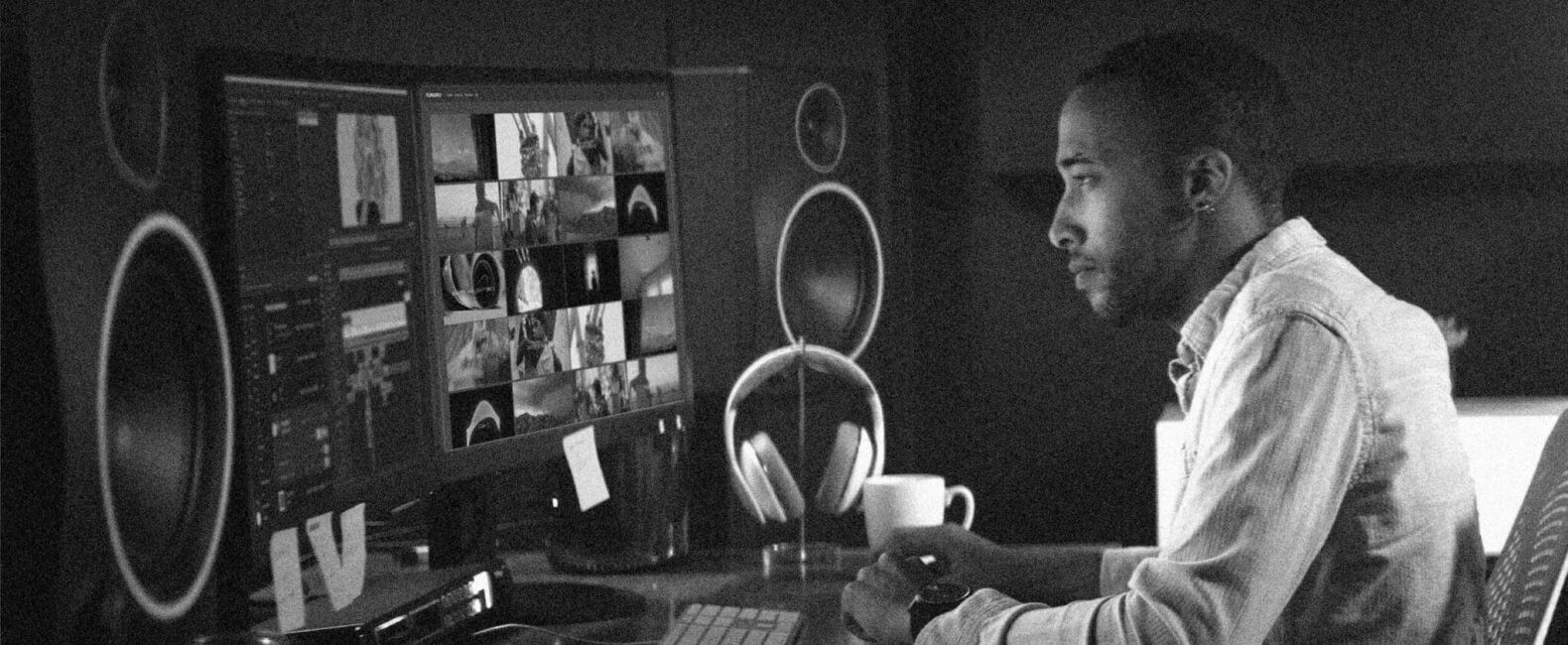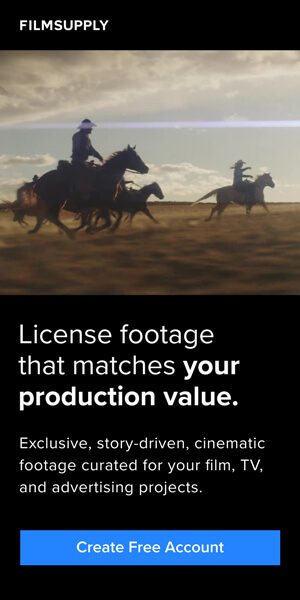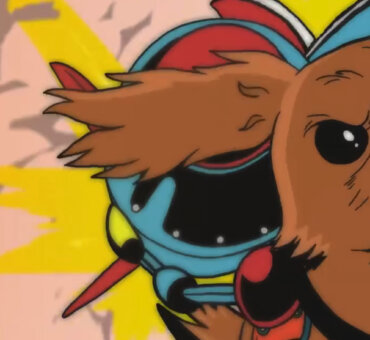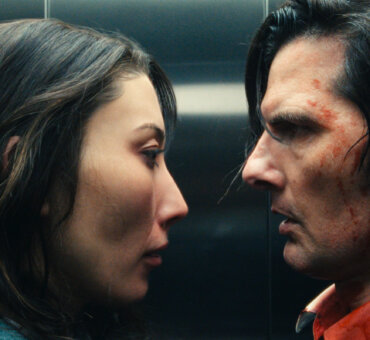A Guide to Being a Freelance Editor
There’s maybe no word that incites terror or excitement equally as much as ‘freelance’. For many editors, it represents risk, uncertainty, and potential homelessness. For others, it represents freedom, opportunity, and a life well-lived.
There’s some truth to both sides of this equation, which is exactly why we wanted to clear some things up. We reached out to veteran freelance editors George Manzanilla and Carter Gunn to ask that burning question on your mind: Should I become a freelance editor? If so, how?
Between the two of them, there’s dozens of years of professional editing experience. George has edited projects for Eddie Bauer, Comcast, Pepsi, Sierra Nevada, and many more. Carter is currently taking the Netflix world by storm, having worked on several award-winning documentaries like Flint Town and Fire in Paradise.
Regardless of the project, though, the qualities of being a good freelancer remain the same. We talked to each of them about:
- Essential skills for freelance editors
- Networking and putting yourself out there
- Managing the business
- Managing your time and stress levels
But, before we tackle the ‘how’ of the matter, let’s tackle the first part of the question. Here’s George Manzanilla and Carter Gunn’s guide to becoming a freelance editor.
Should You Even Go Freelance?
The freelance world can be a scary world, but much more so in theory than reality. Some people rely on security and that’s ok—they need a set salary and regular office hours. But, those things can also hold you back, too. A set salary means, well, that it’s set. And office hours are the definition of inflexible.
We think the litmus test for going freelance is this: If you’re already considering it, then that’s your answer. George agrees:
“I would say definitely do it. In editing, I think a lot of jobs are going to go freelance,” George told us. “There are positives and negatives, but I wouldn’t have it any other way. You get to do a lot of stuff that you wouldn’t be able to do as a nine-to-fiver. You still have that flexibility of time, which is really cool. That’s one of the main reasons freelancers are kind of unhireable for regular jobs. Plus, the sky’s the limit on your income. You can make a lot more than you can usually at a nine-to-five, salaried job.”
I think a lot of jobs are going to go freelance… There are positives and negatives, but I wouldn’t have it any other way.
It may seem scary to make the leap, but freelance work is the art of betting on yourself. You got into this game because you’re creative and you can take that same creativity into the business world. When we asked Carter the same question, he said freelance work means more flexibility and, ultimately, no restriction on how much money you can make in the industry.
Sure, we can say that you need to have a good work ethic. You need to be able to budget well. You need to be able to network. But, you already know these things. What you really need to know is that the work is out there for editors, and clients are willing to pay handsomely for it—you just need to make the leap and, if you’re already considering it, it seems like you’re a prime candidate.
Long story short: If you’re reading this post, yes you should go freelance. Now that we’ve answered the burning question, let’s dive into George and Carter’s advice on how to make the most of it.
Know Your Stuff
As a freelancer, you’re running solo. That’s the entire point. But, at those nine-to-five jobs you do have the benefit of a team. You have other professionals who can carry the workload and responsibility of managing their own tasks. When Carter went freelance, he quickly found he didn’t have that luxury.
“I learned that I needed some serious technical chops if I ever actually wanted to make it,” he told us. “My first even piece of advice is, be more technically proficient than you thought you needed to be, especially coming from an in-house place. You need to know how to do all of your own work.”
This may sound obvious, but it’s true. Learn the ins and outs of every aspect of editing and also the peripheral aspects of your job as well, that way you can know what you need and what you don’t need when your pitching to clients. There’s a business aspect to this point as well—you can make much more money if you know skills beyond your timeline.
“If you only work in Premiere, learning a little bit of After Effects will help you a lot. If you only cut, learning some basic coloring will help you a ton. For some of the smaller projects, being able to know how to finish that project to the end will land you the job and you get to keep all the money instead of handing it off to someone else. I recommend a lynda.com subscription and learning some applications you didn’t know before. I took two weeks off and just learned Avid before I stepped onto my first Netflix show. It was like a must.”
As a freelancer, you’ll learn that the entire business is about leveraging your talent and skills. If you can grow your skills, then you’re giving yourself more and more opportunities to succeed because of it.
The name of the game in freelance is to build relationships with people that last years.
Put Yourself Out There
This is the hard part, at least for most filmmakers. You excel in the editing bay, basking in the glow of the screen until the early morning hours. But, in the freelance world, the sun is going to rise and you’re going to have to find new work by talking to people. That’s just the way it is.
Both George and Carter said the same thing—that most of your clients are going to come from word of mouth, references, and simply just people you’ve gotten to know. And that’s good news! But, especially at the beginning, you’re going to have to pitch yourself and put yourself out there. Carter pointed out that it takes practice to get on these important calls, so maybe wait on calling your dream clients for now.
“One big piece of advice is never call the person you really want to work with on your first call,” Carter told us. “When I was living in San Francisco, I thought I could call whoever I wanted and I remember I called the guy who made the The Times of Harvey Milk and I said his name wrong and I just destroyed it. But, moving to LA, the first thing I did was I went to 72andSunny, and a couple of other agencies and just tried to introduce myself and kind of get in the room.”
Business calls are a learned skill, especially for us creative types. But, once you get better at it, you can begin to build lasting relationships and rely less and less on those calls. It’s the magic of networking. If those connections are strong enough, you can come back to the well over and over again.
“Look at it more as building relationships than just getting jobs,” George added. “The ideal thing is getting repeat clients who keep coming back to you for years. That’s really the name of the game in freelance is to build relationships with people that last years. Maybe they’ll use you at another company they’re working at, or, wherever they move, they keep coming back to you because they know that you’ll always deliver. That’s what it takes.”
This doesn’t just go for clients, either. It’s extremely important to get to know other freelance editors and post-production professionals, too. First, you can subcontract work to other freelancers when you’re swamped, giving you the ability to bring on more work and more income when the opportunity is there. Second, though, you can just give that work to editors when you’re overworked—and maybe they’ll do the same when they run out of space in their own schedule.
You’re more than an editor, you’re a small business owner.
You’re Not a Person. You’re a Business.
Depending on your personality, this can be one of the most rewarding parts of a freelance career. You’re more than an editor, you’re a small business owner. Some of it sucks (ahem, taxes), but some of it can be extremely rewarding.
One of the most difficult parts of the process can be valuing yourself accurately. If you’re like most creatives, we tend to downplay our own talent and value, but this can kill your income. So, George recommends starting with the amount you need to survive and building your pricing structure from there. Once you have a baseline, you have a reference for what’s “good” and what’s “bad” as far as a daily rate goes.
“You want to work freelance to make more than just survive, though. The way I look at it is that the company has to make money, and you have to make money. Early on, I just said, ‘Well, I need 4,000 a month to pay my bills, pay rent, be able to eat, and have a decent life.’ Now, I still do that, but I will definitely try to make it a little bit more of a calculated process where I’ll actually put a budget together when I’m bidding something, and I’ll put it in my day rate, and I’ll actually calculate a 15% overhead for the company.”
This is more of an editorial note, but we recommend always airing on the side of more, not less. This may sound obvious or easy, but it’s really not. Like we said, creatives tend to undervalue themselves, so just assume you’re doing that when you arrive at that first number. Then, think that your client is wanting premium work from a premium professional—so treat yourself as such.
But, another point George made is that once you get a full workload, you can begin to test the numbers, too. Once you have enough work to support yourself, you’ll have more confidence in quoting higher numbers because you don’t have to have the job to survive.
But, with greater rates come greater responsibility and George pointed out that being a good business person is almost more key than being a good editor when it comes to return clients.
“That’s one of the things I’ve found that keeps clients coming back—make yourself easy to work with, treat it like a business, and remember it’s about customer service,” George said. “You don’t want to get taken advantage of, but you don’t want to nickel and dime your client. Be flexible enough to work with them and with their budget.”
People won’t be expecting you to be flexible on your numbers. They won’t expect you to answer emails right away. But, when you do, you’re reinforcing in their mind that you’re a business that solves problems for them—and that will make them a return client.
Another key skill of a business owner is being success oriented, and not project oriented. Carter said that when he worked at a post-house, he would only want to work on “sexy” projects. But, now, he has to be more open to projects of all kinds, because who knows where they’ll lead.
“Do work that sucks. You might have to take some work that you don’t want to do, right? But, there’s only so many ways you can meet new people to work with and sometimes that means taking one for the team and if you do a good job on it, that’s still a client,” Carter told us. “I think that’s pretty important. Swallow your pride a little bit with some work; you’ve got to get paid.”
In other words, all work is sexy as a freelancer. And, once you accept that, it because a beautiful thing.
You definitely have to know your limits.
Self-Management is Key
Managing stress as a freelancer is an entirely different ballgame. Instead of a demanding boss, you have yourself to contend with—and that’s not necessarily easier. Plus, with the ebb and flow of a workload, it can be hard to anticipate when things will be busy or when they’ll be slow.
George has a strategy for managing his workload, though, and it starts with breaking down his process into three general stages:
- Initial planning and prep stage
- Assembly and refining the first edit
- Presenting the rough edit and addressing client notes
Once he can recognize the generalized steps in a project, he can then know how to manage his work. His key is to not have any more than two projects overlapping at the same stage in any given time. Every editor is different, but he said it’s important to know your limits and then stick by them.
“If you have three jobs in that stage, that’s when I start looking at outside help because that means that I’m just not going to be able to deliver a quality product on any of them,” he told us. “You definitely have to know your limits. That’s another tough thing for freelancing is just knowing when too much is too much. I’ve definitely reached that point and vowed to never be there again. It’s unhealthy to overwork yourself like that. No amount of money is worth that stress.”
And that’s a great way to end this post. Intentionality is perhaps the most important skill in a freelance life. It’s so easy to lose sight of the reason why you went freelance in the first place—the flexibility and space to live your life outside of work. You can quickly overload yourself in pursuit of a dollar and then you’re spending more hours in front of a screen than you did in your day job.
Carter had this advice:
“Make sure when you do have time off, take actual time off. I think it’s super important for people to not take half time off, half work on,” he said. “Even if it’s just a day, fully commit to it. Otherwise, you’re never fully satisfied. You don’t feel like you had a break and you don’t feel like you totally got something done. I think it really is important to say, ‘I’m not working this weekend. I’m going to go for a hike. Do not disturb.’”
There’s nothing more rewarding than being the master of your own destiny. Bringing in new clients, finishing jobs, and getting those clients to come back is the epitome of catharsis. It’s easy to get lost in it.
So, work hard at it. Then, don’t. Go take a hike—you’ve earned it.
__
A huge thanks to George and Carter for offering their advice to future freelancers. They’re both extremely talented professionals and thoughtful individuals, so check out their sites (http://www.cartergunn.com/ and (http://georgemanzanilla.com/) if you need some high-end editorial work on your next project.






